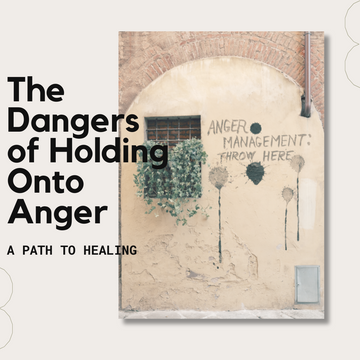Anger is a natural emotion, one that every person experiences at some point in life. It can arise from a moment of frustration, an act of betrayal, or a deep-seated wound that never seems to heal. While it's normal to feel angry, holding onto anger for extended periods can have serious consequences for both your physical and emotional well-being.
The Physical Toll of Anger
When anger lingers, it activates the body's stress response, triggering the release of stress hormones like cortisol and adrenaline. These hormones prepare your body for a "fight or flight" response, which can be useful in short bursts but is harmful when sustained over time. Here’s how holding onto anger can affect your body:
- Increased Blood Pressure: Chronic anger keeps your blood pressure elevated, increasing your risk of heart disease and stroke.
- Weakened Immune System: Prolonged anger can suppress your immune system, making you more susceptible to illnesses and infections.
- Digestive Problems: Anger can lead to issues like acid reflux, ulcers, and irritable bowel syndrome (IBS) due to its impact on your digestive system.
- Insomnia and Fatigue: The stress hormones released when you're angry can interfere with your sleep patterns, leading to insomnia and chronic fatigue.
- Tension and Pain: Anger often manifests physically as tension in the muscles, leading to headaches, back pain, and other forms of chronic pain.
The Emotional Impact of Anger
Emotionally, anger can be just as destructive. Holding onto anger, especially anger towards oneself, can erode your mental health and well-being.
- Depression: Anger turned inward often manifests as depression. This self-directed anger can stem from feelings of guilt, shame, or inadequacy.
- Anxiety: Chronic anger creates a constant state of tension and worry, contributing to anxiety disorders.
- Bitterness and Resentment: Holding onto anger can turn into bitterness, poisoning your relationships and interactions with others.
- Low Self-Esteem: When you’re angry at yourself, it can lead to a negative self-image, making it difficult to value or believe in yourself.
Anger is often considered a secondary emotion, meaning it typically arises in response to underlying feelings such as fear, hurt, or vulnerability. It serves as a defense mechanism, masking these deeper, more painful emotions that might feel too overwhelming to confront directly. For instance, fear of rejection or failure can manifest as anger because it's easier to express than admitting to fear or insecurity. By understanding that anger is often a cover for other emotions, we can begin to address the root causes of our anger, leading to more effective emotional healing and growth.
The Dangers of Anger Towards Oneself
Self-directed anger is particularly damaging. It’s often rooted in perfectionism, regret, or self-criticism, and it can create a vicious cycle of self-blame and negativity. This type of anger not only harms your emotional well-being but can also prevent you from growing and healing. When you’re constantly angry at yourself, you close yourself off from the compassion and forgiveness needed to move forward.
How to Release Anger
Letting go of anger, especially long-held anger, is challenging but essential for your health and happiness. Here are some strategies to help release anger and find peace:
- Acknowledge Your Anger: The first step in letting go of anger is recognizing and admitting that you’re angry. Suppressing or denying your anger will only intensify it.
- Practice Forgiveness: Forgiving those who have hurt you, and more importantly, forgiving yourself, is crucial in releasing anger. Forgiveness doesn’t mean condoning what happened, but it allows you to free yourself from the burden of anger.
- Mindfulness and Meditation: Engaging in mindfulness practices can help you become aware of your anger without being consumed by it. Meditation, in particular, can help calm your mind and reduce the intensity of your anger.
- Physical Activity: Exercise is a powerful way to release pent-up anger. Physical activity helps burn off stress hormones and provides a healthy outlet for your emotions.
- Talk It Out: Sometimes, talking about your anger with a trusted friend, therapist, or counselor can help you process and release it.
- Write It Down: Journaling about your anger can provide an emotional release and offer insights into the root cause of your feelings.
- Focus on Solutions: Instead of dwelling on what made you angry, shift your focus to finding solutions. This proactive approach can help you feel more in control and less consumed by anger.
Conclusion
Anger, when held onto, can wreak havoc on your body and mind. It’s important to acknowledge your anger, understand its roots, and take steps to release it. By doing so, you can protect your physical health, nurture your emotional well-being, and create a path toward healing and growth. Remember, the journey to letting go of anger begins with self-compassion and a willingness to move forward.

